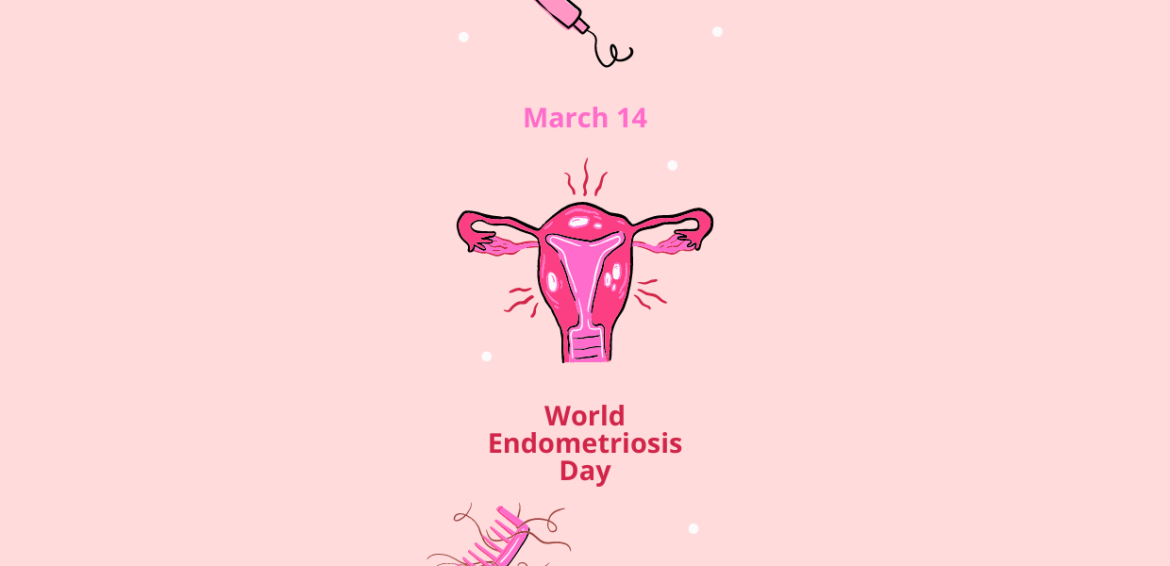Discover Shocking Statistics: Endometriosis Affects 1 in 9 Women in Australia
What is endometriosis?
Endometriosis is an inflammatory condition in which the endometrial tissue, which normally lines the uterus, grows in abnormal parts of the body. This typically occurs in the pelvic region and can range from the external surface of the uterus, the ovaries, fallopian tubes, abdominal wall or intestines. This abnormal growth can have several side effects such as severe pelvic pain, fertility complications, painful menstruation and cramps, pain during sexual intercourse, fatigue, lower back pain and gastrointestinal symptoms associated with IBS such as bloating, constipation and diarrhoea. Some people with endometriosis may have no symptoms at all. Due to such a large range in symptoms, it can often take a long time for someone to be diagnosed with endometriosis, which can only be done through laparoscopy surgery where a biopsy is taken and tested.
How can nutrition help manage endometriosis?
We know that chronic inflammation and oestrogens play a key role in the pathogenesis of endometriosis. We can also influence both oestrogens and inflammation through diet and lifestyle factors to manage symptoms and improve quality of life for those living with endometriosis. Here are some key dietary components that play an important role in the management of endometriosis symptoms:
Fibre
Diets that are rich in fibre from complex and low glycaemic index carbohydrates have been shown to lower the amount of oestrogen that is circulating in the body and reduce the risk of developing endometriosis. A high fibre diet (>25g per day) can be achieved by consuming a diet that has a wide, diverse range of plant-based foods such as wholegrains, fruits and vegetables.
Antioxidants
Antioxidants, which can be both made by the body or consumed from dietary sources, combat free radicals which are generated by the body when undergoing oxidative stress. Due to endometriosis being an inflammatory condition, consuming a diet high in antioxidants can significantly reduce symptoms by directly combatting inflammation. Antioxidants are found in a wide range of wholegrains, fruit and vegetables.
Fats + Alcohol
Ensuring that you are consuming enough omega 3 fatty acids, which can be found in fatty fish (salmon, mackerel, tuna, sardines, herring), nuts, seeds and plant oils is important as research has shown that people who consume higher amounts of omega 3’s are less likely to develop endometriosis. It can also reduce endometriosis related pain.
Foods such a trans (less common in Australia), saturated fats (full fat animal products) and alcohol are associated with increased risk of endometriosis and should be limited.
FODMAPS
Due to abnormal growth of endometrial tissue in areas such as the large intestine, IBS symptoms can ensue from endometriosis. A low FODMAP diet can significantly improve and manage IBS symptoms. This diet is not to be done long term due to its restrictive nature, and therefore is the most effective and beneficial when completed with the guidance of a dietitian.
Supplements
A food first approach is always best, however, if you have gotten a blood test and you are deficient or on the lower end of the healthy range, supplements can help boost your levels back to within the healthy range.
Vitamin D
Research has shown that people with higher vitamin D content in their blood are less likely to develop endometriosis, and if they have been diagnosed, are more likely to experience less pain from the symptoms. Vitamin D supplementation will generally start at 1000IU per day; however this can depend on the extent of deficiency.
Vitamin C and E
Research has shown that women with endometriosis (within the study) had a lower vitamin C and E intake compared to women without endometriosis by 30% and 40% respectively. These vitamins are high in antioxidants and are therefore great to include in a healthy diet to promote an anti-inflammatory diet. Research has shown that supplementation with these vitamins significantly reduced endometriosis symptoms. Increasing intake of fruit, vegetables and extra virgin olive oil are easy ways to increase vitamin C and E intake through food or supplementing at 1000mg and 1200IU respectively.
It is important to note that nutrition is not a cure for endometriosis. However, consuming a healthy, balanced diet can play a role in prevention and management of symptoms. Treatment and management can range from medical, surgical or complimentary (allied health professionals). It is best to discuss your case with your doctor to find what your best options are.
References:
Barnard ND, Holtz DN, Schmidt N, Kolipaka S, Hata E, Sutton M, Znayenko-Miller T, Hazen ND, Cobb C, Kahleova H. Nutrition in the prevention and treatment of endometriosis: A review. Front Nutr. 2023 Feb 17;10:1089891. doi: 10.3389/fnut.2023.1089891. PMID: 36875844; PMCID: PMC9983692.
Nirgianakis, K., Egger, K., Kalaitzopoulos, D.R. et al. Effectiveness of Dietary Interventions in the Treatment of Endometriosis: a Systematic Review. Reprod. Sci. 29, 26–42 (2022). https://doi.org/10.1007/s43032-020-00418-w
Nabi MY, Nauhria S, Reel M, Londono S, Vasireddi A, Elmiry M, Ramdass PVAK. Endometriosis and irritable bowel syndrome: A systematic review and meta-analyses. Front Med (Lausanne). 2022 Jul 25;9:914356. doi: 10.3389/fmed.2022.914356. PMID: 35957857; PMCID: PMC9357916.


